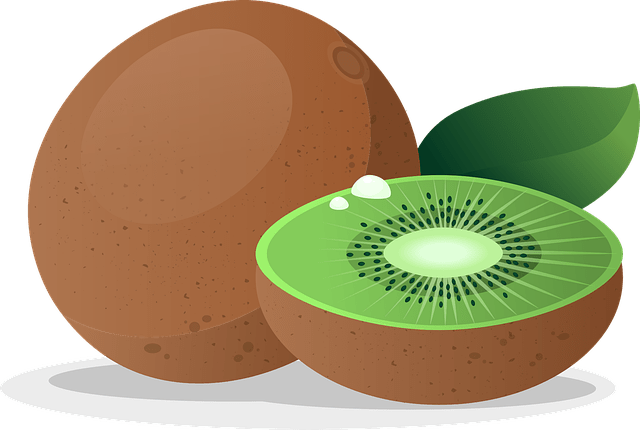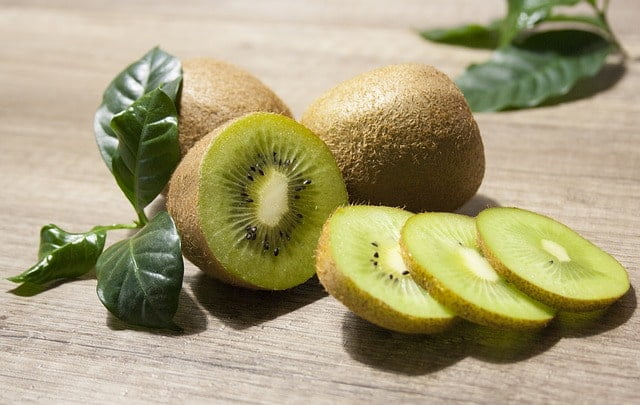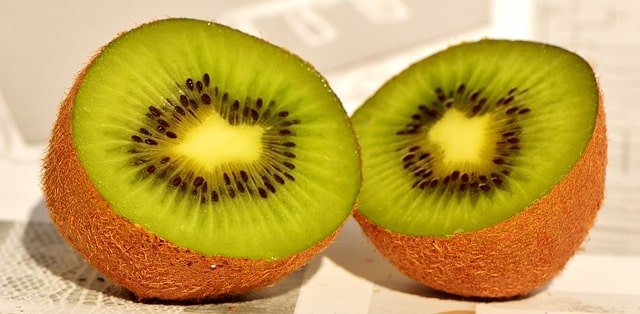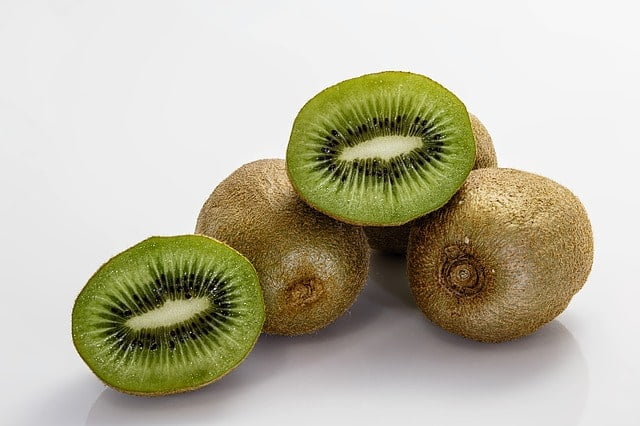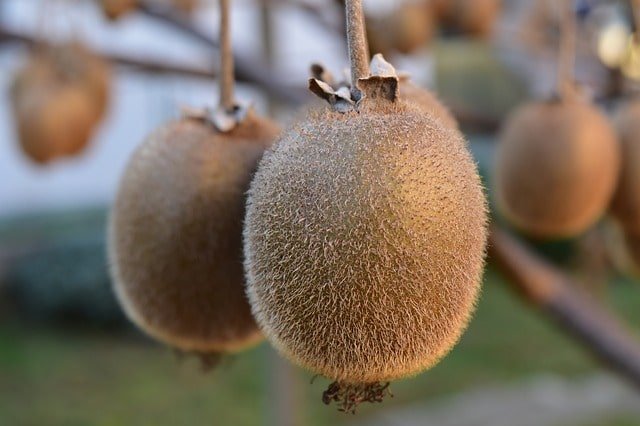What is Kiwi Fruit?
Even though kiwi fruit isn’t commonly thought of as a “superfood,” the vitamins as well as minerals it contains make it an excellent source of nutrition. These dark fuzzy fruits also have a delicious and somewhat tangy flavor, with green flesh within that imparts a unique flavor as well as tropical zing.
The kiwifruit is high in fiber, vitamin C, folate, copper, potassium, antioxidants, vitamin E, and vitamin K. Although the skin as well as its seeds is edible, sometimes people prefer to peel them off due to their fuzzy feel.
Kiwis are hardy fruit that is available year-round. The fruits are produced in California starting from November to May, and also in New Zealand starting from June to the end of October.
What is the Nutritional Value of Kiwi Fruit?
While you’ve probably been informed that this fruit is a good source of Vitamin C, it also has an amazing nutritional profile. This reduced-calorie fruit has a variety of essential elements.
The nutritional value of Kiwi Fruit is as under:
| Nutritional value per 100 gram of kiwi fruit (green, raw) (5) | |
| Energy | 61 Kcal |
| Water | 83.1 g |
| Carbohydrates | 14.7 g |
| Sugars | 8.99 g |
| Dietary fiber | 3 g |
| Protein | 1.1 g |
| Fat | 0.5 g |
| Minerals | |
| Sodium | 3mg |
| Calcium | 34 mg |
| Potassium | 312 mg |
| Copper | 0.13 mg |
| Iron | 0.31 mg |
| Magnesium | 17 mg |
| Phosphorus | 34 mg |
| Zinc | 0.14 mg |
| Manganese | 0.098 mg |
| Vitamins | |
| Vitamin A (equivalent lutein zeaxanthin) | 122 mcg |
| Vitamin B1 (Thiamine) | 0.027 mg |
| Vitamin B2 (Riboflavin) | 0.025 mg |
| Vitamin B3 (Niacin) | 0.341 mg |
| Vitamin B5 (Pantothenic acid) | 0.183 mg |
| Folate | 25 mcg |
| Vitamin C | 92.7 mg |
| Vitamin E | 1.46 mg |
| Vitamin K | 40.3 mcg |
Vitamin C, commonly defined as ascorbic acid, is necessary for the development and repair of body tissues and the proper functioning of the defensive system. Along with vitamin C, kiwis are an excellent source of vitamin K.
Vitamin K is involved in the regulation of blood clotting, digestion, and calcium levels in the blood. Kiwi provides an astonishing quantity of vitamin K for fruit, with 40mcg / 1 cup.
Copper is a trace mineral that aids in the production of red blood cells, promotes bone, neuron, and immune system health, and aids in iron absorption.
Copper is a mineral that is high in kiwis, accounting for 14% of your necessary daily requirement. Kiwis are also a good source of folate, potassium, as well as dietary fiber.
What are the 11 Health Benefits and Uses of Kiwi Fruit?
Friends, below I am mentioning 11 reasons why you should consume kiwi fruit (or 11 health benefits and uses of kiwi fruit):
1) The Kiwi Fruit Helps to Prevent Blood Clots
Kiwis were observed to stop blood clots and keep blood pressure under control by lowering fat in the blood. This occurred without having a detrimental effect on blood cholesterol ratios.
A study has shown that kiwifruit extract contains potent antiplatelet components (1). This may help prevent strokes, and heart attacks.
Generally, aspirin is the medicine of choice for preventing cardiovascular events. There is a downside, though. Aspirin can lead to inflammation as well as ulcers inside the GI tract, though.
If you take two to three kiwi fruits per day, it can give you a healthy heart for a long period of time.
2) Kiwi Fruit Can Assist With Asthma
Asthma may be a severe condition. Wheezing and shortness of breath are two prevalent symptoms associated with this illness.
Vitamin C as well as antioxidants in this fruit can assist asthma sufferers to manage their symptoms.
One research has found that people who eat kiwi on a daily basis had enhanced breathing function.
In another study, fruits rich in vitamins C and E were found to enhance lung functioning in children (2).
3) The Kiwi Fruit Aids with Digestion
Kiwi is rich in dietary fiber, which makes it beneficial for digestion. Kiwi also has an enzyme called actinic in it that promotes digestion of food proteins.
To assist the breakdown of rough proteins in meat as well as fish that might induce bloating, we will recommend you to consume a kiwi immediately after consuming a substantial meal.
Additionally, kiwis do have a moderate relaxing effect that may benefit those with a sluggish digestive tract.
4) Kiwi Fruit Assists with Blood Pressure Regulation
Kiwis can aid in the reduction of hypertension and the prevention of ailments including heart diseases as well as stroke.
One research has shown that eating 3 kiwis per day for 8 weeks reduced diastolic as well as systolic blood pressure as compared with those who ate one apple per day (3).
Kiwis include an antioxidant called lutein, which may account for their blood pressure-controlling properties. Also, kiwis contain vitamin C, which may help lower blood pressure.
5) Build a strong immune system with Kiwi
Vitamin C is essential for cellular activity and defends cells from oxidative stress. It is essential for tissue development and repair as well as supports immune function.
Kiwis’ strong vitamin C level benefits the immune system significantly.
With 103 percent of your daily vitamin C need in a single cup, consuming kiwis daily will help keep off infection, the common cold, as well as flu.
6) Kiwi Fruit Helps to Prevent DNA Damage
The imbalance between free radicals as well as antioxidants in the body is referred to as oxidative stress. This procedure can also split DNA strands. This can result in health concerns, many of which are difficult to diagnose or cure.
The kiwi fruit is high in antioxidants, which can help prevent oxidative stress.
One research on people’s damaged cells with peroxide found that people who have consumed kiwi had a greater ability for their DNA to fix itself following the peroxide application. This indicates that kiwi may aid in the prevention of long-term malignancies and lifestyle disorders like colon cancer. Colon cancer is strongly associated with DNA damage. Thus, Kiwi helps to prevent DNA damage.
7) Enhance your eyesight with Kiwi
Kiwis may help avoid age-related macular degeneration as well as eventually blindness. Kiwi is high in zeaxanthin as well as lutein (often known as the “eye vitamin”).
These two substances do the same thing as other antioxidants do, as well as these also help to make vitamin A, which is important for your eyes.
A strong nervous function can benefit your retina, which has the most nerves and therefore is basically the eye’s communication center.
Additionally, kiwis contain a significant quantity of copper, a necessary vitamin that maintains a proper neurological system and hence the proper working of your eyes.
8) Kiwi Fruit Assists in the Fight against Inflammation
An enzyme (Bromelain) is found in kiwis, pineapples, and green papaya that can crack down proteins as well as fight against inflammation. It can also help people who have allergies. In the body, bromelain starts to crack down inflammatory diseases after you eat a kiwi.
Kiwi has also been demonstrated to reduce arthritis-related inflammation and protect against its progression to other illnesses.
People who get a lot of vitamin C can indeed cut down on inflammation because vitamin C fights free radicals which can induce inflammation in your body. Because Kiwis have a lot of vitamin C, they can help with the treatment of inflammation if you eat them on a regular basis.
9) Get healthy and beautiful skin with Kiwi
Collagen is a necessary ingredient that helps maintain the shape of your skin as well as the toughness of your bones.
Kiwifruit contains vitamin C, which is required for the body to synthesize collagen. Consuming kiwi can assist maintain the skin’s texture as well as keep it nourished and healthy.
Acne is a type of skin irritation that can manifest itself in the form of unpleasant pimples on your face as well as your body. This fruit’s anti-inflammatory effects and vitamin C content may benefit persons who suffer from acne, significantly reducing sebum formation in pores.
Start applying kiwi extract blended with Aloe Vera on the skin, then leave it on overnight for the best results. Do this every night.
10) You can consume Kiwis for weight loss
Kiwis are among the greatest fruits to consume if you’re dieting. They are extremely hydrating. Apart from that, Kiwis are low in calories as well as high in fiber. As a result, they’re ideal as a snack or as a component of a morning shake.
The significant vitamin C content of kiwis is crucial for weight loss. Vitamin C aids in blood pressure regulation, cholesterol management, gastrointestinal health, as well as the immune system.
Additionally, it is involved in the metabolism of lipids. These are all critical considerations while beginning a weight loss quest.
Kiwis do have a low glycemic index, which means that the fruit’s sugar is delivered slowly. As a result, kiwis can indeed aid in blood sugar regulation by minimizing irregular blood sugar rises. Dietary fiber-rich foods help you lose weight by improving your sense of fullness and aiding your digestive system.
11) Kiwi Fruit may Promote Your Sleep
Consuming this fruit before bed can improve your sleep quality.
Being a good source of serotonin, it helps to induce sound sleep.
In a study, it was found that men, who were given two kiwifruits one hour before bed, had improved sleep quality by 42% at the end of the study time (4).
Thus, having this fruit in the evening is beneficial if you are suffering from insomnia.
What are the Side effects of Kiwi Fruit?
Friends, kiwi fruit has numerous health benefits, but it has some Side effects too. These are:
1) Allergic responses
Eating this fruit may cause adverse responses. It is essential to follow precautions while consuming it. Kiwi fruit consumption has been linked to increased risk of cross-allergy and other health problems for many people.
2) Skin itching and Swelling
According to research, excessive kiwi consumption might result in edema. Individuals who consume an excessive amount of kiwi may get anaphylaxis. Additionally, rashes, asthma, as well as hives are prevalent.
3) OAS (Oral Allergy Syndrome)
Numerous people have claimed OAS as a result of excessive kiwi consumption. The OAS is characterized by swelling of your face, lips, especially tongue.
Additionally, it causes oral tingling as well as itching.
4) Dermatitis
Individuals who consume large amounts of this fruit on a regular basis run the risk of developing skin problems like dermatitis.
5) Pancreatitis Complications
Kiwi consumption in excess might result in acute pancreatitis. This delicious fruit is a high source of potassium, serotonin, as well as vitamins C and E. Excessive amounts of these elements can affect the blood’s triglyceride balance, causing long-term damage to the pancreas.
6) Symptoms of Diarrhea and Collapse
Additionally, one of its negative impacts is vomiting, nausea, as well as diarrhea. Consumption of Kiwi may result in dizziness and difficulty in swallowing.
Conclusion
Kiwis can be very healthy and nutritious if you take them properly. Never consume it in excessive amounts. Consuming one or two kiwis daily is an excellent way to boost cardiovascular as well as intestinal health. Kiwis can be added to smoothies or a nutritious snack every day. If you haven’t tried it till now, just try and see how it makes you feel better.
Frequently Asked Questions:
Question: Can we eat kiwi skin?
Answer: Yes.
You can eat the skin of this fruit as well because its skin contains a higher concentration of antioxidants than its flesh.
Question: How many kiwis Can I eat a day?
Answer: The number of kiwis you consume, totally depends on factors like health status, age, and what you’re trying to treat.
Consuming one to three kiwis a day is enough to get its whole health benefits.
It is recommended not to eat more than 3 kiwifruits a day.
Question: Can I eat kiwis every day?
Answer: Yes, you can eat this fruit every day.
References:
1) US National Library of Medicine, National Institutes of Health
https://www.ncbi.nlm.nih.gov/pubmed/24219176
2) Children’s lung function and antioxidant vitamin, fruit, juice, and vegetable intake
https://www.ncbi.nlm.nih.gov/pubmed/12965883
3) The effect of kiwifruit consumption on blood pressure in subjects with moderately elevated blood pressure: a randomized, controlled study
https://pubmed.ncbi.nlm.nih.gov/25483553/
4) Effects of Diet on Sleep Quality
https://pubmed.ncbi.nlm.nih.gov/27633109/
5) U.S. Department of Agriculture Food Data Central (Kiwifruit, green, raw)
https://fdc.nal.usda.gov/fdc-app.html#/food-details/168153/nutrients
Disclaimer: This article is intended for informational purposes only. Any information associated with this article should not be considered as a substitute for prescriptions suggested by local healthcare professionals.
Recommended Articles:
1) Pineapple: Uses, Health Benefits, Types, and Nutrition
2) Bananas: Calories, Nutrition Facts, & Health Benefits
